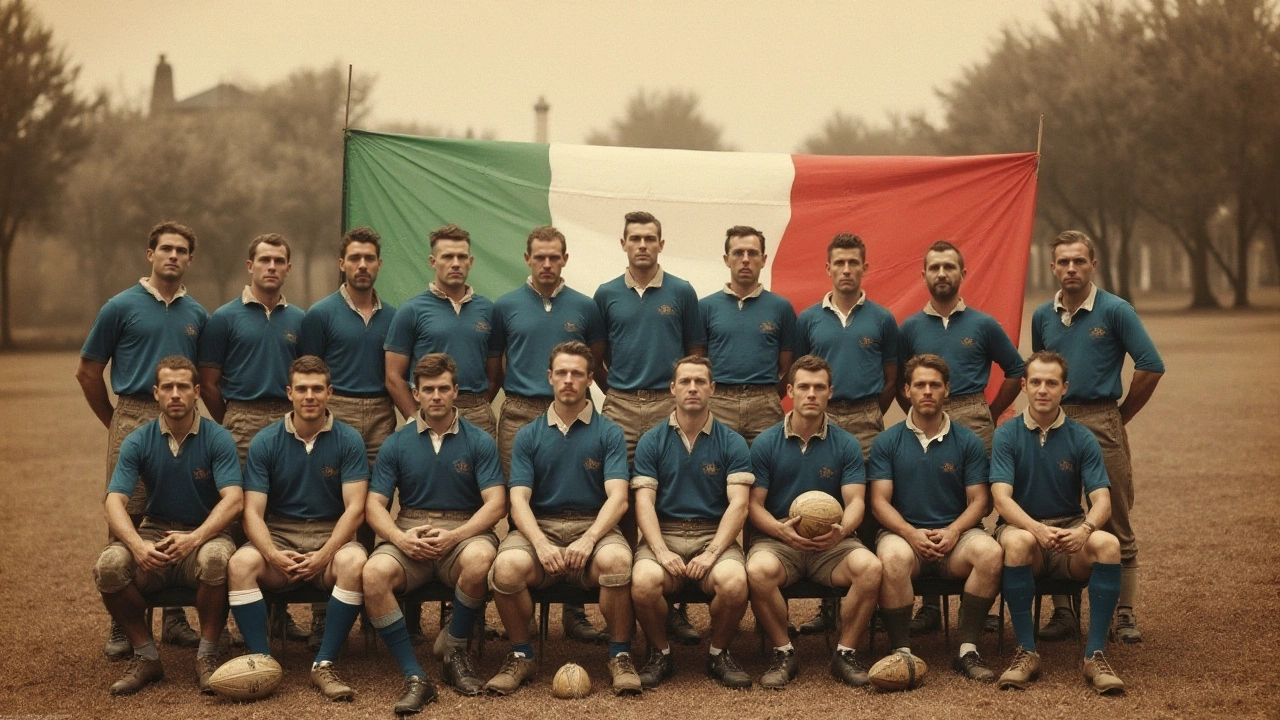Italy's national rugby team proudly bears the nickname 'Gli Azzurri', a term draped in tradition and national pride. This moniker translates to 'The Blues', inspired by the distinct azure color of their jerseys, a shade that resonates with Italy's identity. But why azure, and what does it signify?
While the Italian rugby scene might be younger compared to others, it has quickly grown, gaining respect and admiration worldwide. Their participation in major international competitions and rugby fixtures showcases their determination and spirit. Today, we delve into the origins of this popular nickname, explore Italy's rugby history and its cultural nuances, and discuss the team's standing in the global rugby arena.
- The Origin of 'Gli Azzurri'
- Italy's Rugby History
- Cultural Significance of the Nickname
- Italy's Position in International Rugby
The Origin of 'Gli Azzurri'
In the world of Italian sports, the nickname 'Gli Azzurri' holds significant weight, and its origin is as fascinating as it is revealing of the nation’s rich history. The term 'Azzurri', which means 'The Blues', is a direct reference to the azure blue color of the team's jerseys. This color choice is not arbitrary but deeply rooted in Italy's royal history. The azure represents the House of Savoy, Italy's ruling family until the end of World War II. Their coat of arms famously featured this bold azure color, which explains its adoption by various national teams, including rugby, as a homage to the monarchy’s legacy.
The blue jersey has become an integral part of Italy's national identity in sports, transcending rugby to include football and other sports disciplines. This iconic shade is celebrated by fans and players alike, who feel an unspoken connection to their country's historical narrative every time they don the color. Notably, the choice of blue binds Italy's past with its present, an unbroken thread from the monarchy to the modern republic, symbolizing continuity and unity.
Interestingly, the rugby community embraced this color with fervor, possibly more so because it added a unique touch to the sport. Unlike many other teams that opt for more traditional hues such as red or green, Italy’s blue stands out distinctively on the field. This distinctiveness is not merely aesthetic but psychological, engendering a sense of pride and belonging among players and supporters.
"Wearing the azure jersey isn't just about playing the game; it's about carrying on a national tradition," shared former captain Sergio Parisse in an interview.
The Italy rugby team's journey on the international stage showcases this essence of pride. Since joining the Six Nations Championship in 2000, they've been competing fiercely against nations with longer rugby histories. Although victories might have been sparse, the spirit of the Azzurri remains unyielded, driven by this cultural legacy. The rich hue of their jerseys is a beacon of determination and resilience on the field, underscoring their nickname’s enduring power. Fans eagerly follow rugby fixtures to witness this iconic display of heritage and excellence.
With Italy's continued presence and steady rise in the rugby world, 'Gli Azzurri' are not just a nickname but a testament to Italy's vibrant national spirit. The azure jersey remains an emblem of the past, reflecting an undying love for sport and country, inspiring awe and reverence among peers and rivals. As the Azzurri take to the field, they radiate a sense of history that few other teams can emulate, making them a beloved fixture in the annals of rugby history.

Italy's Rugby History
Italy's journey in rugby might not be as ancient as some of the powerhouses of the sport, but it is rich with stories of resilience, fervor, and growth. The roots of rugby in Italy stretch back to the early 20th century, a period when the country's sporting landscape was evolving rapidly. Rugby was first introduced in Italy by capitano Ossio Buonconsiglio, around the year 1910, primarily in the northern regions where sporting clubs began organizing friendly matches. These formative years were characterized more by enthusiasm and curiosity than widespread knowledge about the game rules and strategies.
The real turning point for Italian rugby came in the 1920s, as the Italian Rugby Federation (FIR) was established in 1928, paving the way for structured development and organization. This was a decade that saw Italy striving to find its identity on the international stage, and rugby offered a new athletic avenue to achieve this. In 1934, Italy became a member of the International Rugby Board, marking its formal entry into the rugby community. The first test match was played against Spain in 1929, marking a historic moment as Italy cautiously stepped into the competitive arena. Slowly, the sport started capturing the attention of fans across the nation, building a loyal base cultivated through passion and community involvement. A focus on nurturing young talent became paramount, with clubs popping up in university towns and regions that embraced the spirit of rugby.
The Rise of Gli Azzurri
As the years rolled by, particularly towards the late 20th century, Italy began to establish itself more prominently within the rugby world. The period saw 'Gli Azzurri' participating in their inaugural Rugby World Cup in 1987. Their entrance was not just a statement of capability but reflected the growing ambition of a team keen to leave its mark. Despite challenges faced on-field, the growth in skill level, strategic play, and coaching expertise showed Italy’s commitment. A hallmark achievement occurred in the late 1990s when Italy was invited to join the Six Nations Championship in 2000. This invitation was a testament to their evolving competitiveness and signaled a new era for Italian rugby. Italy’s participation injected fresh vigor and introduced a distinct flavor to this prestigious league.
Being part of the Six Nations meant facing the perennial giants of rugby in Europe, which has been both a daunting and enlightening experience for Gli Azzurri. The journey has certainly not been without its hills and troughs, but it has been instrumental in improving standards. The inaugural match against Scotland is fondly remembered by fans as a historic victory, which saw Italy defeating a seasoned opponent. Enrico Francato, a celebrated coach, once remarked,
"Rugby in Italy is not just a sport; it is an embodiment of the Italian spirit of adaptability and tenacity."
| Significant Year | Event |
|---|---|
| 1928 | Establishment of Italian Rugby Federation |
| 1987 | First appearance in Rugby World Cup |
| 2000 | Joined the Six Nations Championship |
Though scaling the ranks has been challenging, Italy's national team has achieved memorable victories and has steadily improved its skills and reputation worldwide. The experience gained from competing against top-tier teams has been invaluable, fostering a new generation of players committed to honing their craft. Today, through a mix of youthful dynamism and veteran experience, Italy continues to strive toward higher accolades in rugby. Rugby, as it stands in Italy, is a testimony to what dedication, unwavering belief, and concerted efforts can achieve.

Cultural Significance of the Nickname
The nickname 'Gli Azzurri' carries much more than just a reference to the Italy rugby team's attire. It represents a rich tapestry of national pride and cultural identity that binds the Italians together across different sports. The azure hue is historically rooted in the royal blue associated with the House of Savoy, Italy's royal family before the republic was established. This color has endured as a symbol of unity and tradition, transcending the political changes that the country has seen over the centuries.
This pride in tradition is not an abstract sentiment; it influences Italy's team sports deeply. The Italian rugby team, like its counterparts in soccer and other sports, shares in this heritage. Wearing the blue jersey isn't simply donning a team uniform—it's a continuation of a legacy that ties modern athletes to their country's past. When players step onto the rugby field, they don't just represent a team but a whole nation, kindling the collective spirit wrapped up in that distinct azure fabric.
Sporting excellence intertwined with cultural identity has pushed this sea of blue far beyond the stadiums of Rome and Milan to international fields. With each game, the Italian rugby squad becomes a living tableau of Italian culture, an embodiment of sporting heritage well understood by its citizens. These azure-clad players carry the whispers of history, showcasing Italy's dedication not just to the game, but to the celebration of their shared cultural tapestry.
Interestingly, the nickname goes further than just garments or history; it touches the Italian way of life. Italians are known for their exuberant personality, love for celebrations, and cherishing former glories with modern refinements. The nickname reflects these traits—the resilience, creativity, and exuberant flair that have become synonymous with Italy itself. An Italian renowned sports journalist once remarked,
"Gli Azzurri is more than a title—it's a sentiment. It evokes the splendor of Italy's skies and seas, uniting us under a common blue flag everyone treasures."

Italy's Position in International Rugby
In recent years, Italy's rugby team has steadily asserted itself as a formidable force within the international rugby community. Despite their relatively late entry onto the world rugby stage, with the team's participation becoming more prominent around the 1980s, the Italian rugby squad known as Gli Azzurri has managed to capture both the enthusiasm and respect of rugby aficionados. Their consistent participation in the Six Nations Championship since 2000 marked a significant milestone, providing them with a platform to battle against some of the sport's historical heavyweights including England, France, and Ireland. Although victories have been hard-won and sometimes few, these efforts have laid the groundwork for what is undoubtedly a growing and promising rugby future in Italy.
Competing in the Six Nations, widely regarded as one of the most prestigious international tournaments, has required Italy to continually raise its game. This participation has not only improved their performance but has also enriched the Italian rugby culture. Despite the challenges they face, Italy's inclusion has added a dynamic edge to the tournament. Their historic win against Scotland in 2007 was particularly memorable, marking one of those rare times when Italy upset longstanding rugby hierarchies. As Italy continues to compete in these challenging fixtures, both fans and experts remain optimistic about the future they hold in the world of rugby.
Interestingly, the Italian rugby team has also found success against non-European teams, participating in all Rugby World Cups since 1987. Although they have yet to progress beyond the group stage, their persistence is evident. These matches have provided not only valuable experience but have also increased their exposure on the global stage. Such international exposure has opened up opportunities for talented players to shine and for Italy to be seen as a key participant with potential to grow.
"Italy's rugby journey is a testament to their resilience and growing prowess on the international arena," commented a respected analyst from 'ESPN Rugby'.Italians take immense pride in hosting and visiting teams from around the world, contributing to the rich tapestry of international rugby.
Analyzing their performance statistics provides further insight into their international position. The dedication of the Italian rugby teams is reflected in their consistency, with matches against superior teams improving their strategies and teamwork. While they might not yet boast a winning record over seasoned teams such as New Zealand or South Africa, they continue to dedicate resources to nurturing talent and expanding their playing style. As rugby evolves, Italy's commitment to growth is evidenced by increasing investments in training facilities and youth programs aimed at cultivating the stars of tomorrow.
Italy remains an intriguing participant with ample room for growth in international rugby. With thoughtful strategies and continuous development, prospects are promising for this team to eventually not only regularly secure victories in the rugby fixtures against top-tier teams but also to climb the ranks in global standings. Optimism abounds, and with support from local fans and international enthusiasts alike, Italian rugby seems set to become an even bigger player on the international stage.





